Japan Esports Laws: Legal Framework, Compliance & Key Challenges
Updated On: November 20, 2025 by Aaron Connolly
Core Legal Framework for Esports in Japan
Japan’s esports sector sits atop three main legal frameworks that both tournament organisers and developers have to work through. These rules set boundaries for prize money, gambling, and physical venues, which makes compliance a bit trickier than in other gaming markets.
Overview of Relevant Regulations
Three core laws really shape esports in Japan.
The Act Against Unjustifiable Premiums and Misleading Representations puts a lid on prize money when game makers sponsor their own tournaments. If developers run events for their own games, strict prize caps kick in. Third-party organisers, though, can dodge these limits.
Gambling Offences under the Penal Code ban tournaments where entry fees go straight into the prize pool. The law treats this as illegal gambling. Organisers have to either skip entry fees or use sponsor money for prizes.
The Act on Control and Improvement of Amusement Business deals with physical gaming venues. Tournaments in commercial spaces with consoles may need special licences. This hits LAN parties and offline events pretty hard.
These laws explain why Japan’s esports scene took longer to get going compared to other places. Early tournaments kept prizes small or went online-only just to stay out of legal trouble.
Distinctive Aspects of Japanese Law
Japan’s approach is pretty different from what you see in the West.
Prize money restrictions just aren’t a thing in most countries. In the US and EU, tournament prizes can get huge, but Japan slaps a cap on them if developers are involved. This forces organisers to get creative with funding.
Physical venue licensing goes beyond usual event rules. Game cafés and esports arenas need special permits that regular event spaces skip.
Online tournament exemptions make things easier. Online-only events avoid most of the headaches, which explains why Japan’s virtual tournaments and streaming scene have grown much faster than offline events.
Japan’s laws reflect a wider stance on gambling and consumer protection. Old laws, written way before esports was a thing, now end up controlling competitive gaming in surprising ways.
Definition and Scope of Esports
Japanese law doesn’t actually spell out what counts as esports.
Tournament classification depends on how the event runs, not just the fact that it’s competitive gaming. Prize rules, venue, and who’s organising matter more than whether it’s a “sport.”
Gaming equipment distinctions also play a part. PCs and smartphones, since they do more than just gaming, face fewer restrictions than dedicated consoles. That technicality changes what kind of licence a venue might need.
Professional player status stays fuzzy. There’s no special legal category for esports athletes—players just use general entertainment or self-employment laws.
Since there’s no dedicated esports law, organisers have to carefully design each event to fit inside existing rules. Every tournament needs its own legal check to make sure it doesn’t break any regulations.
Esports Tournament Regulation
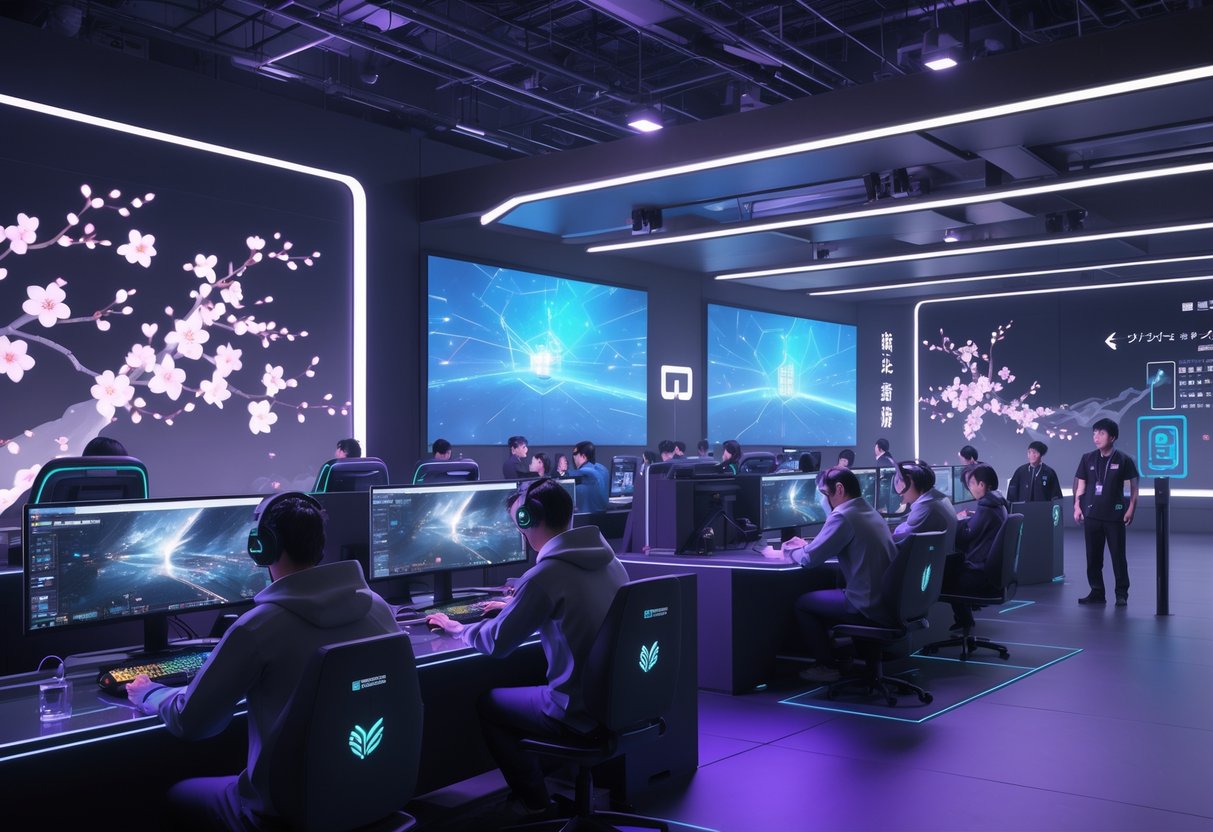
Tournament organisers in Japan have to deal with a legal maze around prize money and sponsorships. These rules come from consumer protection and gambling laws that can really change how tournaments get funded and structured.
Requirements for Tournament Organisers
Japanese law lays down strict rules for organisers. The big one is the Act against Unjustifiable Premiums and Misleading Representations.
Organisers need to avoid being seen as handing out “premiums” to customers. That label sticks when three things line up: enticing customers, making it part of a transaction, and providing an economic benefit.
Key compliance strategies include:
- Having third parties (not game makers) organise tournaments
- Making sure participation doesn’t require buying the organiser’s products
- Using free-to-play games where purchases don’t affect gameplay
- Framing prize money as “remuneration for work” for pro players
The Penal Code’s gambling rules add another layer. If entry fees create the prize pool, that’s gambling.
Solutions include:
- Skipping entry fees altogether
- Keeping operational costs and prize money in separate accounts
- Letting sponsors pay winners directly
- Using sponsor money for prizes, not player fees
Organisers also have to watch out for venue rules under the Act on Control and Improvement of Amusement Business, which can change depending on where and how the event runs. More on that here.
Prize Money Rules
Prize money hits a hard 100,000 yen cap (about £600) under the premium laws when events fall under the Act against Unjustifiable Premiums and Misleading Representations.
Still, big Japanese tournaments often hand out prizes way above 100 million yen by following certain compliance tricks.
Successful approaches include:
| Method | Requirements | Result |
|---|---|---|
| Third-party organisation | Non-game maker organises | No premium classification |
| Free participation | No product purchase required | Avoids customer inducement |
| Professional compensation | Qualifying rounds, skilled players | Counts as work remuneration |
| Sponsor funding | Separate prize pool funding | Bypasses premium limits |
The professional licence system set up by the Japan Esports Union (JeSU) helps get around prize money limits. Licensed pros can get bigger prizes as work pay, not as “premiums.”
For paid games, organisers usually run qualifying rounds to pick top players for the finals, where the real money gets handed out.
Sponsorship and Advertising Limitations
Sponsorships need careful handling to stay legal. If game makers sponsor (not organise) a tournament, that can still trigger premium rules.
Critical considerations:
Sponsor involvement can’t create a direct link between buying a game and winning prizes. Sponsoring players or events works better than sponsoring tournaments for the sponsor’s own games.
Advertising restrictions include:
- Not claiming that buying a game boosts your tournament chances
- Keeping marketing separate from tournament promotion
- Making sure sponsorship doesn’t become customer inducement
Financial separation is a must. Sponsorship cash and participation fees need to stay in different accounts, with clear records.
Best practices involve:
- Letting sponsors pay winners directly
- Using neutral tournament platforms
- Avoiding any advantage for sponsor games in the event
- Showing transparent prize funding
A lot of successful events use several smaller sponsors instead of one big game company. This spreads out the risk and lets them keep prize pools high.
Act Against Unjustifiable Premiums and Misleading Representations

This Japanese law sets tough rules about when esports organisers can offer prize money and what triggers government scrutiny. The heart of the issue is whether prizes count as “premiums” that might mislead gamers about the products.
Impact on Esports Prize Distribution
The Act clamps down on prize money when tournaments act as promotional tools for game companies. If a developer runs their own event, any prizes become “premiums” and get capped.
When the Act applies:
- Game makers run tournaments for their own games
- Players have to buy the game to join in
- Prizes promote certain titles
The law sets the top “premium” value at 20 times the purchase price or ¥100,000, whichever’s less. So, for a ¥6,000 game, a winner’s prize maxes out at ¥120,000.
Ways to avoid restrictions:
- Letting a third-party run the event
- Using free-to-play games with no pay-to-win
- Opening tournaments to anyone, no purchase needed
Prize money from sponsors, not game sales, usually falls outside these limits.
Interpretation in the Esports Industry
The pro esports world has found ways to work around the law. Organisers set up tournaments so prizes don’t count as “premiums” at all.
Many Japanese events call prize money “remuneration for work” instead. This treats pro players as entertainers making competitive content, not just consumers picking up freebies.
Common industry practices:
- Keeping sponsor money separate from game sales
- Using open qualifiers that don’t require buying the game
- Signing pro player contracts that treat tournaments like work gigs
The Japan Esports Union offers guidelines to help organisers set up entry fees and prize pools legally. Their framework makes sure tournaments don’t profit off entry fees while keeping the competition fair.
This way, big esports events can run smoothly, and consumers don’t get misled into buying games for a shot at a big prize.
Gambling Laws and Esports
Japan’s strict gambling laws shape how esports tournaments run, making life tricky for organisers who want to stay legal. These rules decide if prize money setups cross into illegal gambling, so entry fees and formats need careful planning.
Distinguishing Esports from Gambling
The Japanese Penal Code says gambling happens if players pay entry fees that go directly into the prize pool. That’s the dividing line between legal and illegal tournaments.
Legal tournament structures include:
- No entry fees for players
- Entry fees only cover operational costs
- Prize money coming from sponsors or outside sources
The main thing is that prize money can’t come from entry fees. If sponsors fund the prizes separately, tournaments stay on the right side of the law.
Quick win: Run online-only events to skip venue rules altogether.
If a tournament gets flagged as illegal gambling, organisers can get fined up to 500,000 yen. Players can also face penalties if they take part.
Most successful Japanese esports events use a “sponsor-funded model”—tech companies or gaming brands cover the prize money. This keeps player payments and rewards totally separate.
Implications for Tournament Prize Structures
Prize money rules really shape how we set up competitive gaming in Japan. Organisers have to design payment flows that pass legal muster.
Compliant prize structures usually mean:
- Sponsors cover all prize money
- Entry fees only pay for venue and gear
- Clear separation between costs and rewards
The Japan Esports Union recommends keeping participation fees under the total tournament costs divided by the max number of players. That way, organisers don’t profit just from entry fees.
Warning: Using home consoles or arcade machines at venues can trigger extra Amusement Business Act rules.
For international tournaments, organisers often set up separate legal entities just to handle prize payouts. This keeps prize money and entry fees totally apart.
Because of these rules, lots of Japanese esports events go for free entry with big sponsor backing. That’s actually a great chance for brands to get in front of esports fans.
Act on Control and Improvement of Amusement Business
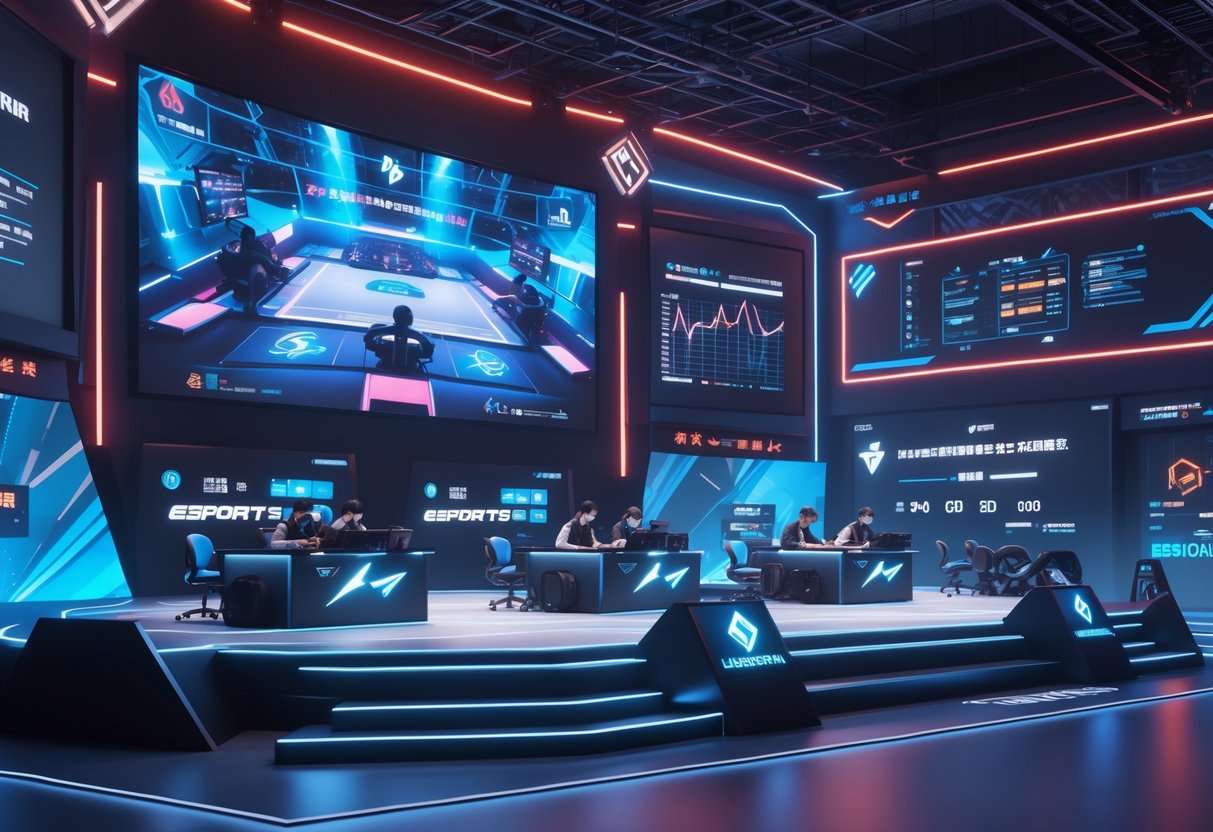
The Act on Control and Improvement of Amusement Business affects esports facilities and tournaments with strict licensing rules and prize limits. Most venues offering gaming equipment need permits, and organisers can face a £750 prize cap if their event gets classified under this law.
Criteria for Classification as Amusement Business
The Act spells out two main requirements that snag a lot of esports setups. First, the venue needs to have gaming gear like video game consoles in a physical space.
Second, the business must let customers use that gear to play games. This covers most esports cafés and gaming centres.
Video game consoles mean any device that shows game results on a screen. So, gaming PCs, consoles, and even mobile gaming setups can count.
The law also mentions equipment that “may arouse a spirit of gambling.” That’s broad, and it catches competitive gaming where players chase rankings or achievements.
Some venues sidestep these rules by calling themselves internet cafés instead of gaming spaces. Others just rent out space and let customers bring their own gear.
Warning: Even “internet cafés” can fall under these rules if they mostly offer gaming or only have gaming PCs.
Licensing for Esports Events
If you run an esports tournament in Japan and it’s classified as an amusement business, you’ll hit the harshest restriction: prize money can’t go over ¥9,600 (about £50-75).
This rule only covers events held in physical venues where the organiser supplies the gaming gear. Online tournaments? They usually dodge these limits entirely.
| Event Type | Prize Limit | Licensing Required |
|---|---|---|
| Physical venue with equipment | ¥9,600 | Yes |
| Online tournament | No limit | No |
| One-time event | Potentially exempt | No |
Organisers have to get permits from their prefecture’s Public Safety Commission before they can run tournaments. The process involves background checks and facility inspections, which feels pretty thorough.
Here’s a tip: A lot of successful Japanese esports events team up with game publishers instead. This way, they can qualify under different advertising laws, letting them offer much bigger prize pools through the Premiums and Representations Act.
If you’re running a one-time event, you might not need any licensing at all. The law defines “business” as repeated profit-seeking activity, so a single tournament often slips through the cracks.
Prepaid Payment Instruments and Virtual Goods
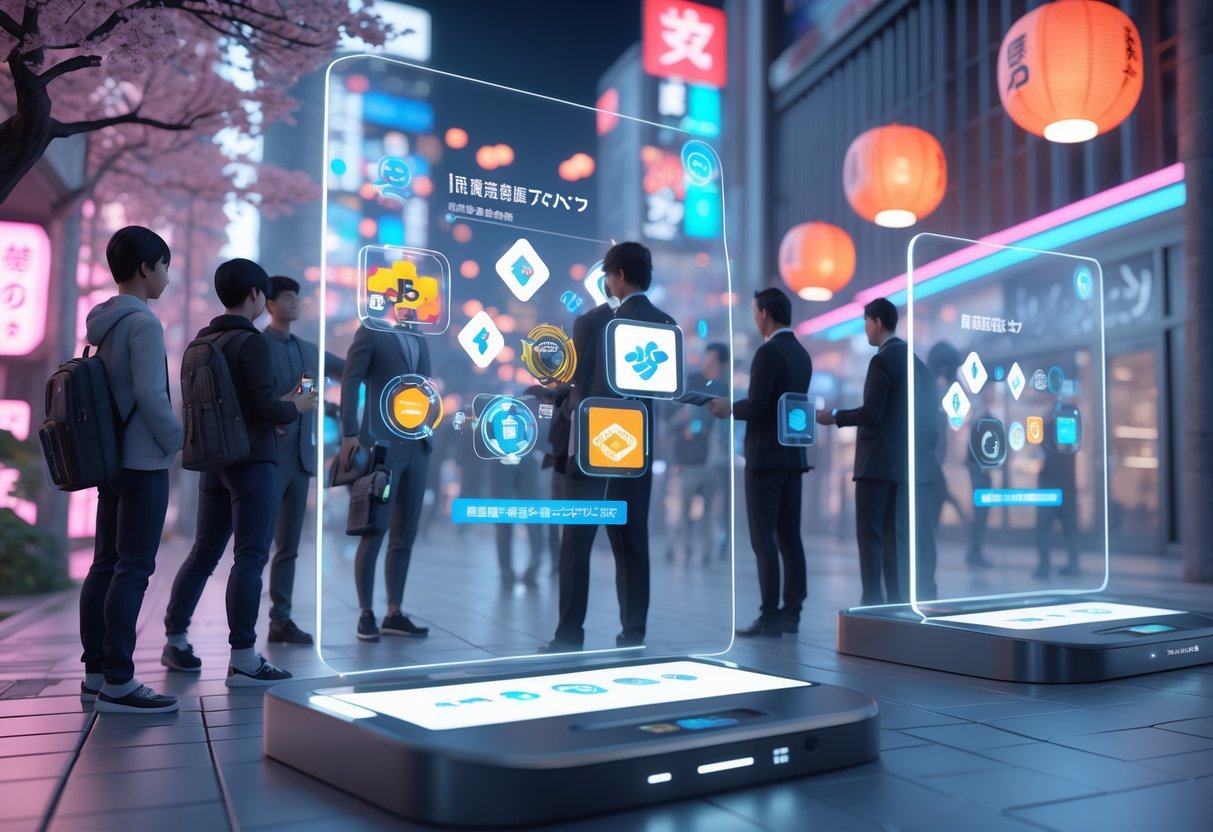
Japan’s Payment Services Act clamps down hard on in-game currencies and virtual items. Game publishers need to know their legal obligations when players buy digital currencies or items that count as prepaid payment instruments.
Compliance with the Payment Services Act
In-game currencies and virtual items often count as prepaid payment instruments under Japanese law. This happens when digital items fit certain criteria.
The law says prepaid payment instruments are items that store value based on money paid in advance. If players buy digital currencies, tokens, or items with real cash, those usually fall under this category.
Game publishers have to figure out if their virtual goods qualify as prepaid payment instruments. They need to check:
- Value storage: Does the item hold monetary value?
- Prepaid basis: Do players pay real money up front?
- Usage scope: Where and how can players spend the currency?
Foreign publishers who want Japanese players also have to comply. The law doesn’t care where your company is based.
Before launching games with qualifying virtual currencies, publishers have to submit a “Notification for the Issuance of Prepaid Payment Instruments” to their local Finance Bureau. No notification, no launch.
Obligations for Game Publishers
Once they’re classified as prepaid payment instrument issuers, publishers shoulder a bunch of ongoing responsibilities. These rules exist to protect players and keep everything above board.
Information disclosure requirements are strict. Publishers have to make the terms and conditions for virtual currency purchases crystal clear. Players should know exactly how they can use their digital currency.
The Finance Bureau expects regular reports. Publishers need to submit periodic updates on their virtual currency operations, tracking usage and outstanding balances.
Customer support obligations mean publishers must set up proper complaint handling procedures. They have to resolve player disputes about virtual currency, not just ignore them.
If publishers outsource virtual currency operations, they’re still responsible for those third parties. They have to make sure partners follow all the same compliance standards.
On top of that, publishers need to display information required by the Act on Specified Commercial Transactions—like cancellation policies and business contact details.
Asset Preservation Requirements
Publishers have to preserve assets equal to at least half of all unused virtual currency balances. This rule protects players if a company runs into financial trouble.
Twice a year, publishers calculate asset preservation. They check unused balances as of March 31st and September 30th.
If unused balances go over ¥10 million, publishers must deposit issuance guarantee funds with the Legal Affairs Bureau. That deposit equals half the unused balance.
This rule applies to all qualifying virtual currencies. Publishers can’t just leave out certain types of in-game currency.
If publishers don’t maintain proper asset preservation, they risk regulatory penalties. They could lose the right to run virtual currency systems in Japan.
Staying compliant means monitoring virtual currency usage regularly. Publishers should keep an eye on player spending and unused balance trends all year.
Telecommunications and Online Services Regulation
Japan’s telecommunications laws set out specific rules for esports platforms that handle user data and run online gaming services. The Telecommunications Business Act lays down how gaming companies must protect user communications and handle data.
Telecommunications Business Act Overview
The Telecommunications Business Act says gaming companies need to register as telecommunications carriers if they provide certain online services. This includes esports platforms that let users communicate or manage their personal data.
Registration Requirements:
- Companies offering gaming communication services must notify authorities.
- Platforms with more than 3 million users need formal registration.
- Monthly active user thresholds trigger extra compliance rules.
A lot of esports operators struggle with these requirements. The Act covers things like voice chat, messaging, and user profile features inside gaming platforms.
Key Obligations:
- Data protection for user communications.
- Service continuity during tournaments.
- Emergency response for system failures.
- User privacy safeguards.
Gaming companies have to put technical safeguards in place to stop unauthorised access to user data. Encryption and secure storage are a must.
Requirements for Online Interaction
Esports platforms have to follow strict rules when they let users interact. These requirements aim to protect players from harmful content and keep competition fair.
Content Monitoring Obligations:
- Real-time monitoring of chat
- Automated filtering for banned content
- User reporting systems for violations
- Staff training for moderation
Many platforms use AI to catch bad language or cheating. Human moderators then review flagged content within set timeframes.
User Identity Requirements:
- Age checks for tournament players
- Real name registration for competitive events
- Parental consent for users under 18
- Account verification to fight fraud
Communication Standards:
- Clear rules for acceptable behaviour
- Transparent penalties for violations
- Appeal processes for suspended accounts
- Regular compliance audits and reports
Gaming companies need to keep detailed logs of user interactions for regulatory review. These records help authorities investigate disputes and check platform compliance.
Role of the Japan Esports Union

The Japan Esports Union (JeSU) leads the way as Japan’s main governing body for competitive gaming. They set up professional licencing systems and make sure tournaments follow the law. JeSU builds industry standards while working inside Japan’s complicated legal landscape to legitimise esports as a real sport.
Objectives and Responsibilities
JeSU’s main mission? Transform Japan’s esports scene through professional recognition and regulatory compliance. The organisation launched in February 2018 when three separate esports associations merged to create a unified voice.
Professional Licencing System
JeSU issues three licence types to legitimise competitive gaming:
- Japan eSports Pro Licences for professionals
- Japan eSports Junior Licence for younger players
- Japan eSports Team Licence for teams
So far, they’ve issued over 200 professional licences across eleven approved games, including Street Fighter V and Tekken 7. With this system, organisers can offer cash prizes above the usual 100,000 yen cap by classifying competitions as professional sporting events.
Tournament Support and Organisation
JeSU backs esports events all over Japan every month. In 2019, they supported big tournaments like the Puyo Puyo Championship Cup and the first Coca-Cola STAGE: 0 eSPORTS High School Championship.
They’re planning regional branches nationwide to help local tournaments and athlete development. JeSU also helps send Japanese players to international competitions.
Code of Conduct and Industry Standards
JeSU sets up detailed standards to keep everything legal and promote professional behaviour across Japanese esports. These rules help organisers navigate tricky gambling laws and keep the industry credible.
Legal Compliance Framework
The union works inside three big legal areas that affect tournaments:
- Gambling regulations: Pro licences allow bigger prize money
- Consumer protection laws: Standards block misleading promotions
- Business licensing: Compliance with entertainment venue rules
JeSU’s standards say licensed players must meet skill requirements and act professionally at competitions. Organisers have to follow the rules for prize distribution and player checks.
Industry Credibility Measures
JeSU pushes esports legitimacy with standardised formats and athlete recognition. They work with publishers like Bandai Namco, Capcom, and Sony to make sure competitions are authentic.
Regular training helps players understand their professional and legal duties. The union also teams up with media partners to broadcast tournaments on national TV, which helps esports get accepted as a real sport.
Esports Players’ Rights and Contracts
Japanese esports players face some unique legal headaches when they sign contracts with teams. Clear agreements protect players, while dispute mechanisms help keep things fair when conflicts pop up.
Player Agreements and Revenue Sharing
Player contracts in Japan usually fall into two legal buckets. Employment contracts give stronger worker protections but saddle teams with strict labour law rules. Mandate contracts are more flexible but offer fewer player safeguards.
Teams have to think carefully about player status. If teams give detailed instructions, fixed schedules, and company equipment, courts might call players employees. That triggers labour law protections, including tough rules for firing someone.
Revenue sharing needs to be spelled out. Players often keep rights to their game accounts and character progress, even after leaving a team. Teams can’t just grab these digital assets unless contracts say so.
Publicity rights are also a big deal. As players get famous, their names and images gain value. Teams usually manage these rights together but need to clarify usage, pay, and how long it lasts in the contract.
Transfer restrictions are tricky. Teams can limit player movement to protect investments, but going too far violates Japan’s constitutional freedom of occupation. The Anti-Monopoly Act also bans unreasonable transfer limits that hurt competition.
Dispute Resolution Mechanisms
Japanese courts usually side with employees in firing cases. If a team wants to end an employment contract, they have to prove “objectively reasonable grounds” that fit “general societal norms.” That’s a high bar, and it often leads to reinstatement and back pay.
Minors need extra protection. Anyone under 18 must get parental consent for contracts to be valid. Without it, minors can back out completely, and teams have no legal recourse.
Alternative dispute resolution works faster than court. Many teams add arbitration clauses, so disputes go to private mediation before any lawsuit. This saves money and keeps things confidential.
Industry bodies now offer standard contract templates. These help smaller teams avoid legal traps and cover minimum player protections. Still, custom changes are often needed for special cases.
Getting a good esports lawyer really helps with tricky negotiations. Both players and teams benefit from legal experts who get Japan’s unique rules and the fast-changing industry.
Intellectual Property and Broadcasting Rights
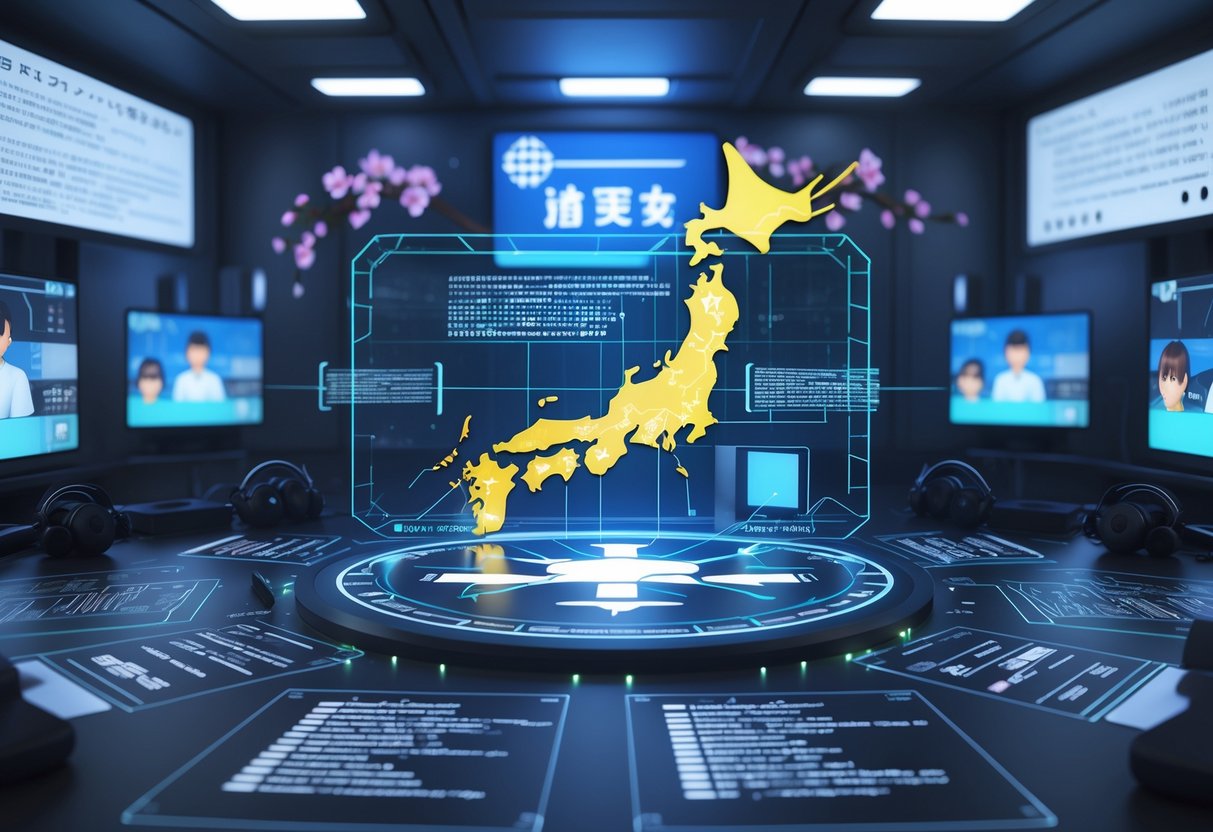
Esports tournament organisers in Japan have to weave through complicated copyright issues with game developers, players, and even spectators. Game publishers own the main copyrights for all visuals and sounds, so licensing agreements are a must.
Copyright Considerations for Esports Events
Game footage rights belong entirely to the original software developers in Japan. Organisers need explicit permission from publishers before they can broadcast any tournament matches.
Most big publishers now offer standard broadcasting licences. These usually cover live streams and recorded content for official events.
Player image rights add another layer. Organisers have to get separate agreements for:
- Live broadcast appearances
- Social media promos
- Merch with player images
- Post-event highlight reels
Spectator considerations aren’t a big deal for online events. But for in-person tournaments, organisers need crowd appearance waivers.
Music and sound effects in games might need extra licensing. Some publishers include these rights in their standard deals. Others want additional payments to music rights organisations.
Heads up: If you use copyrighted game footage without permission, you could get takedown notices or even face legal action.
Licensing of Game Content
Publishers usually set up tiered licensing structures for events of different sizes:
| Event Type | Typical Cost | Coverage |
|---|---|---|
| Amateur tournaments | Free | Basic streaming rights |
| Semi-professional events | £500-£2,000 | Full broadcast package |
| Major competitions | Negotiated | Custom commercial terms |
Most standard licensing agreements put a cap on broadcast duration. Organisers can stream live and keep replays up for 30 days.
If you monetise your stream, expect revenue sharing clauses. Publishers often take 10-25% of ad revenue from official broadcasts.
International streaming adds more hoops. Japanese publishers sometimes ask for separate agreements if you use global platforms.
Here’s a tip: reach out to publishers early when planning a tournament. Many hand out free amateur licences, but you’ll need to wait 2-4 weeks for approval.
Trademark protection isn’t just about logos. You’ll need to watch your use of game names, character designs, and even official terms.
Sports Promotion and Social Recognition

Japan’s government now counts esports as a sport under official legislation. That’s a big deal for how competitive gaming gets treated.
Several organisations push to make esports as legitimate as traditional athletics.
Esports Under the Basic Act on Sport
Japan’s Basic Act on Sport now covers esports. Tournament organisers, team managers, and game developers can all be called “sports organisations” if they mainly promote esports.
This status brings perks and responsibilities. Esports groups get access to government sports funding and support.
They also have to follow the same rules as other sports bodies.
Key organisations now included:
- Tournament organisers
- Professional team management companies
- Game developers (if focused on esports)
- League operators
The Act puts esports on the same level as football or baseball for promotion. That’s real government backing and a big step for the industry.
Initiatives to Recognise Esports as Sport
In 2019, Japan set up several big organisations to push esports recognition. The General Incorporated Association Japan eSports Promotion Association launched in May that year.
The Japan Amateur e-Sports Association started around the same time.
These groups work on building esports infrastructure across Japan. They set standards for tournaments, player contracts, and competition formats.
The government supports these moves as part of growing the sports business.
Main recognition initiatives:
- Official esports player licensing
- Standard tournament rules
- Accreditation for pro teams
- Building amateur leagues
Private companies that never touched traditional sports now invest in esports. Clearly, Japan considers competitive gaming a real sport.
Future Directions and Legal Challenges
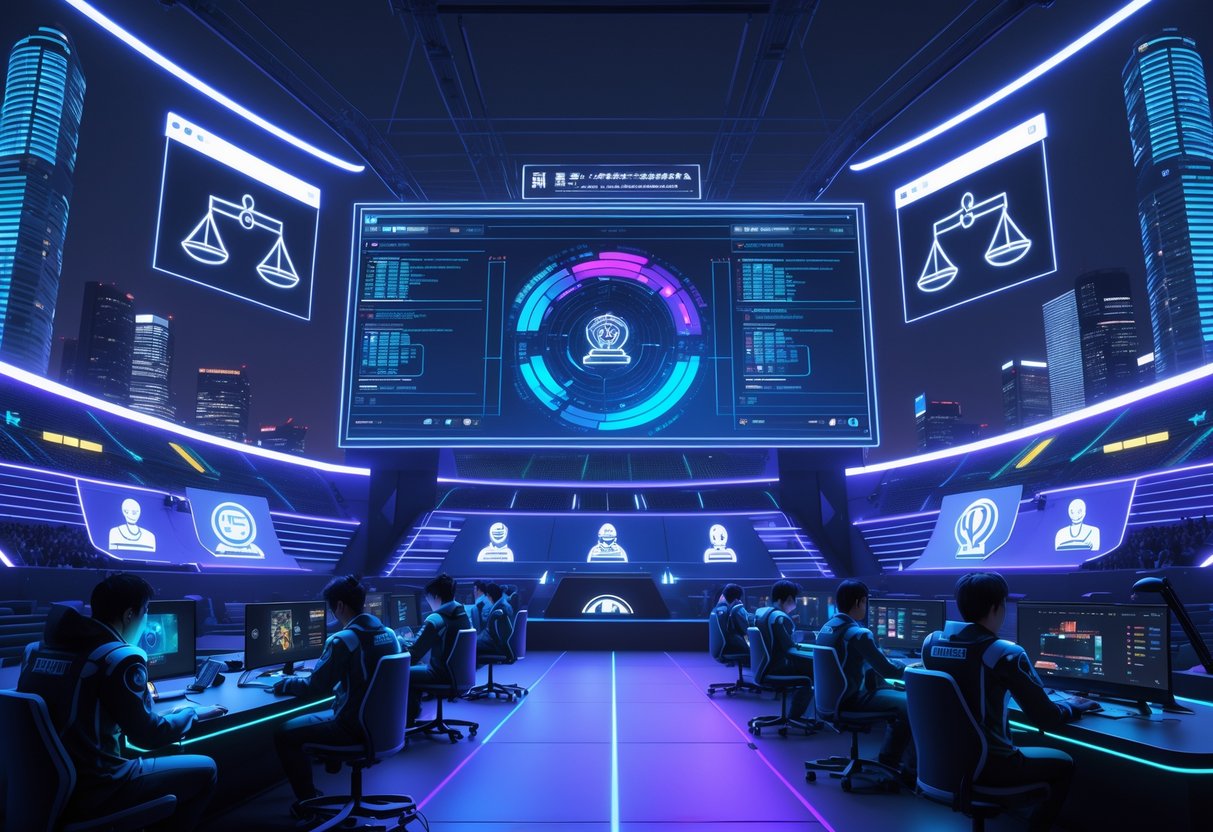
Japan’s esports scene faces new legal hurdles as technology and global standards keep changing. Current reforms target prize money rules and pro licensing.
Next up: mobile gaming competitions and streaming platform regulations.
Emerging Issues in Esports Regulation
Mobile Gaming Competitions now raise legal questions for Japanese regulators. Console tournaments have a set framework, but mobile esports blur the line between games and gambling.
Mobile games often use in-app purchases and virtual currencies for prizes. That complicates things under Japan’s Act against Unjustifiable Premiums and Misleading Representations.
Streaming Platform Governance is another tough area. Live streaming tournaments brings up copyright and moderation headaches.
Platforms like Twitch and YouTube follow different laws. Japanese organisers often get stuck between conflicting international broadcasting rules.
Data Protection is a growing concern as tournaments collect player biometrics and personal info. GDPR-style rules could change how Japanese esports groups handle data.
Virtual Reality Competitions add physical safety concerns to the mix. Current laws don’t mention VR-specific tournament needs or safety standards.
Tournament organisers and players face a lot of uncertainty in these new areas.
Potential Reforms and International Influence
Harmonisation with Global Standards drives many of Japan’s reforms. The Japan Esports Union tries to match domestic rules with international tournament standards.
Prize money restrictions here are still tighter than in other big esports markets. Proposed changes might boost rewards to match global competitions.
Licensing System Expansion could soon cover more than just pro players. Coaches, analysts, and content creators might get new licences.
Tax Reform Initiatives target prize money and sponsorship income. Current rules sometimes double-tax international winnings, which hurts Japanese players abroad.
Broadcasting Rights Modernisation aims to make streaming permissions simpler. New laws would standardise esports licensing across platforms.
International Treaties about esports recognition could also shape Japan’s policies. Officials keep an eye on South Korea and China for inspiration.
Reforms usually take 2-3 years to roll out due to legislative processes. Most industry insiders expect slow, steady change rather than sudden overhauls.
Japan keeps trying to balance traditional caution with the fast-moving demands of esports.
Frequently Asked Questions
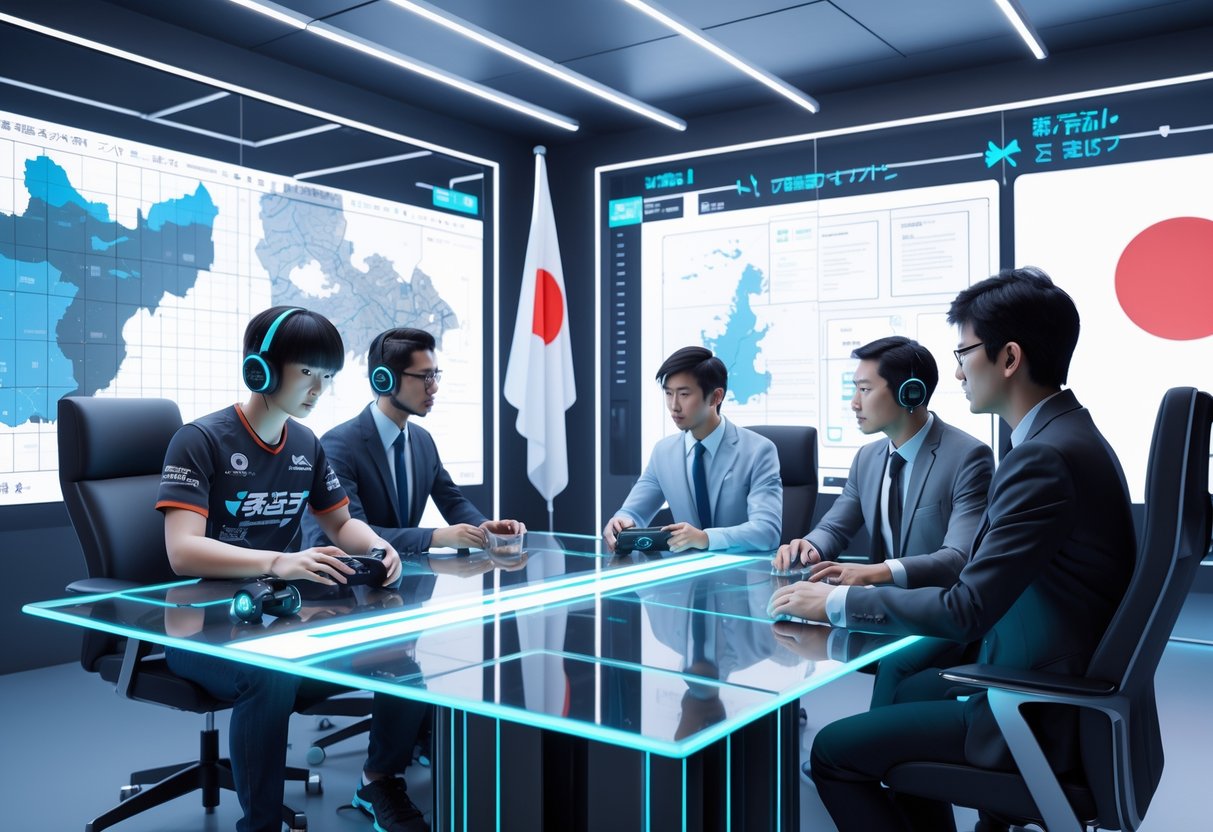
Japan’s esports laws bring some unique challenges—prize money caps, licensing rules, and business regulations all play a part. These rules affect tournament organisation, player taxes, and international competition.
How does Japan regulate the participation of minors in competitive gaming events?
Japan uses the Amusement Business Act to protect minors. The law restricts late-night gaming and limits access to certain venues.
Physical tournaments with gaming consoles must follow strict curfews.
Minors can’t play after certain hours—usually 10 PM on weekdays and 11 PM on weekends. The exact rules depend on the prefecture and the venue.
Online tournaments have fewer restrictions since they don’t involve physical gaming spaces. Still, prize money limits apply no matter the player’s age.
Parents need to give consent for minors to join most tournaments. Organisers often ask for extra paperwork if a participant is under 18.
What legal steps must be taken to host an esports tournament in Japan?
Tournament organisers deal with three major laws: the Act against Unjustifiable Premiums, gambling rules, and the Amusement Business Act. Each law adds its own compliance hurdles.
If you use a physical venue with gaming consoles, you might need a licence from the Prefectural Public Safety Commission. This happens when the event looks like an arcade business with entry fees.
Quick win: Stick to online-only tournaments to dodge most venue-related red tape.
Prize money setups must follow gambling laws. You can’t fund prize pools directly from entry fees, but sponsors can provide prizes separately.
Participation fees should only cover operational costs. If you set fees below break-even, you’re less likely to be classified as a “business” under Japanese law.
Are there any specific visas required for international esports players competing in Japan?
International esports players usually need entertainment visas or temporary visitor visas. The right visa depends on prize money and how long the competition lasts.
Short tournaments under 90 days might allow tourist visas for unpaid players. But if you earn prize money, you’ll need a different visa.
Players on international teams or drawing a salary must get proper work documents. The visa process can take weeks or even months.
Warning: Tourist visas don’t let you earn money in Japan—not even tournament prizes. Break this rule and you risk deportation and future bans.
We suggest talking to Japanese immigration lawyers for tailored advice. Visa needs change based on nationality, prize size, and event length.
How do intellectual property laws in Japan affect the streaming and broadcasting of esports?
Game publishers control broadcast rights for their titles in Japan. Streamers and broadcasters need permission to make money from gameplay footage during tournaments.
Most big esports games publish streaming guidelines that cover tournament broadcasts. Publishers often grant rights for official events but limit commercial use without a licence.
Quick win: Always check a game’s official streaming policy before planning a broadcast. Most publishers share guidelines online.
Music and audio content can cause extra copyright headaches. Organisers need to secure rights for any background music or effects used during broadcasts.
Sponsorship overlays and ads during streams must follow copyright and advertising laws. Japanese law treats sponsored content differently from standard gameplay.
What are the tax implications for esports players earning prizes and sponsorships in Japan?
Prize winnings count as taxable income in Japan. Players must report all tournament earnings, even from overseas events.
Sponsorship money gets taxed differently based on whether the player is a pro athlete or a business. Most pay individual income tax rates.
International players in Japan face withholding tax on prize money. Tax treaties might lower these rates for some.
Warning: If you don’t report esports income, you could face big penalties and back taxes—with interest.
Pro teams often help players manage tax obligations through paperwork and payment setups. Solo players should talk to tax pros who understand esports income.
Can you explain the role of the Japan Esports Union in the regulation of competitive gaming?
The Japan Esports Union (JeSU) acts as the main authority for competitive gaming in Japan. They set out rules for organizing tournaments and handle player licensing.
JeSU gives out professional player licenses, so players can actually receive higher prize money than usual. Licensed players get to earn above the typical legal limits for promotional prizes.
Organizers use JeSU’s tournament guidelines to stay on the right side of Japanese law. The rules cover things like prize money, participation fees, and what venues need.
Quick win: If you follow JeSU’s tournament guidelines, you’re probably safe when it comes to legal issues at most Japanese esports events.
JeSU teams up with government agencies to sort out esports regulations and push for policies that help the industry. They also speak up for Japanese esports in international competitions and organizations.
The union keeps track of player databases and competition records. By doing this, they help esports gain legitimacy inside Japan’s traditional sports world.

